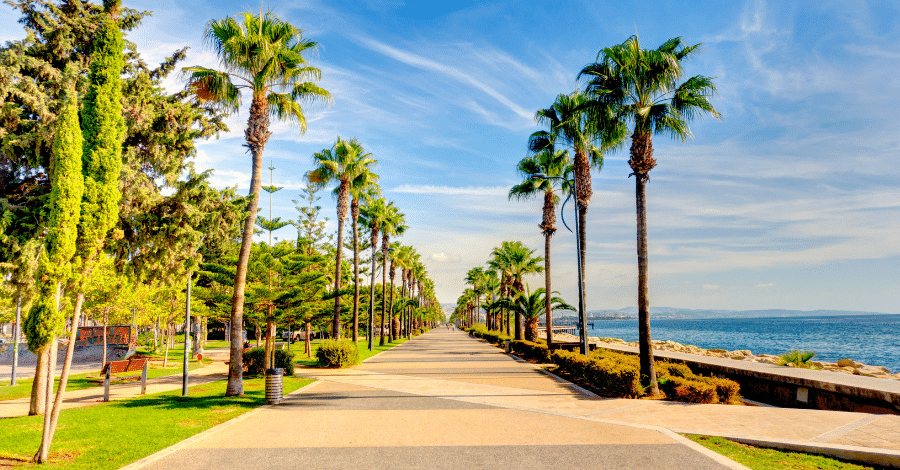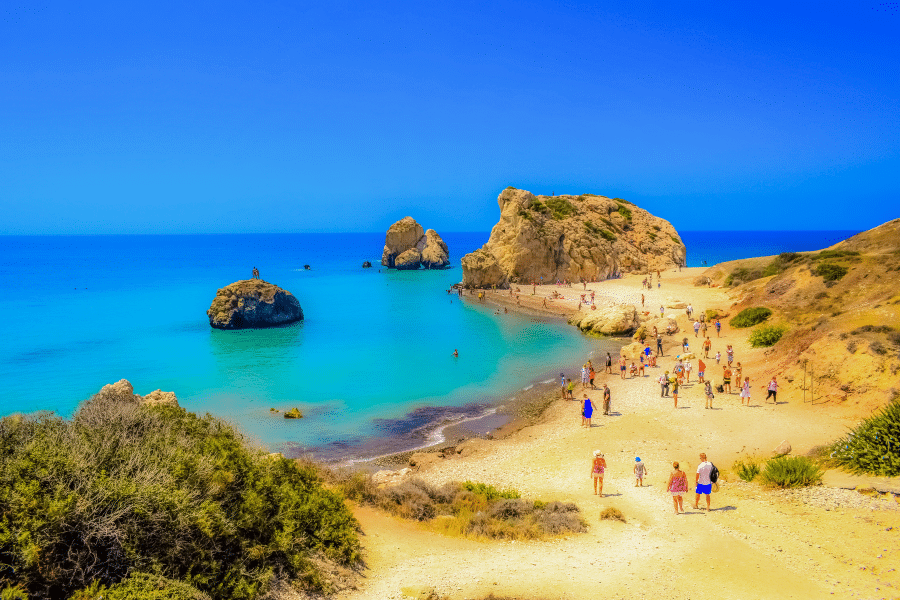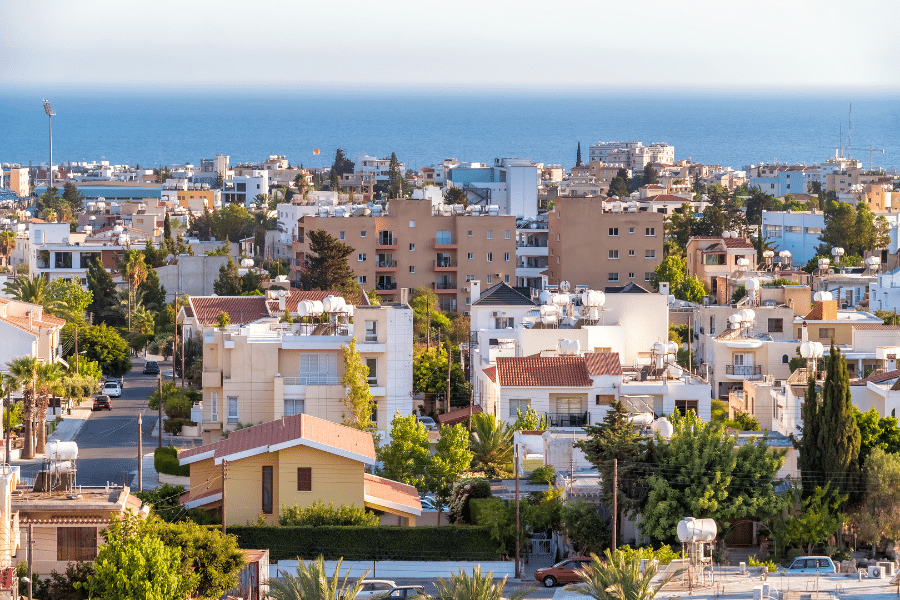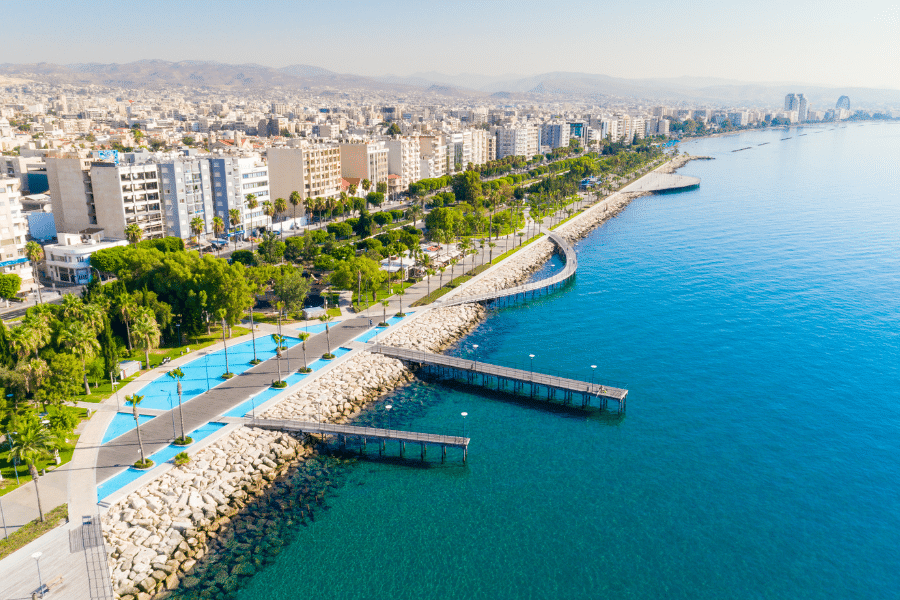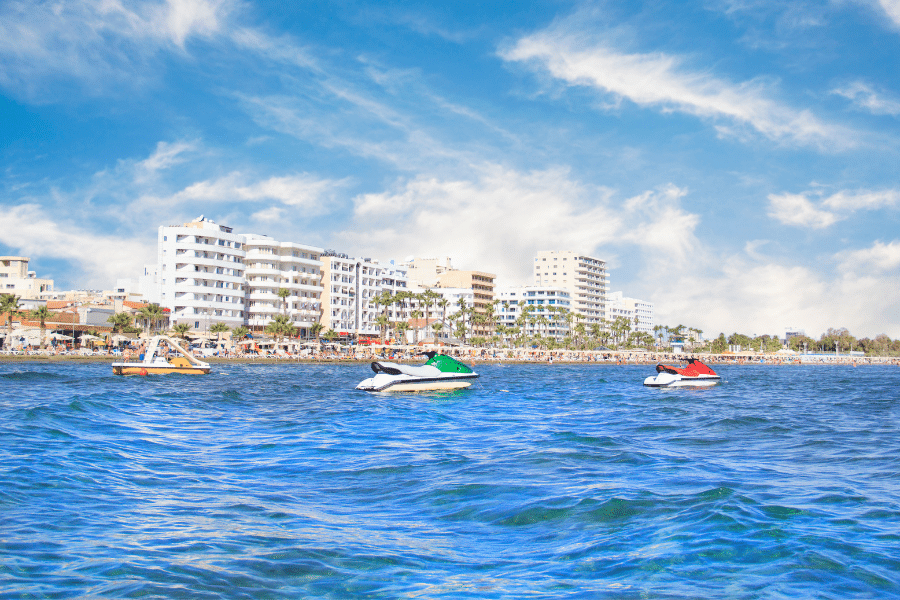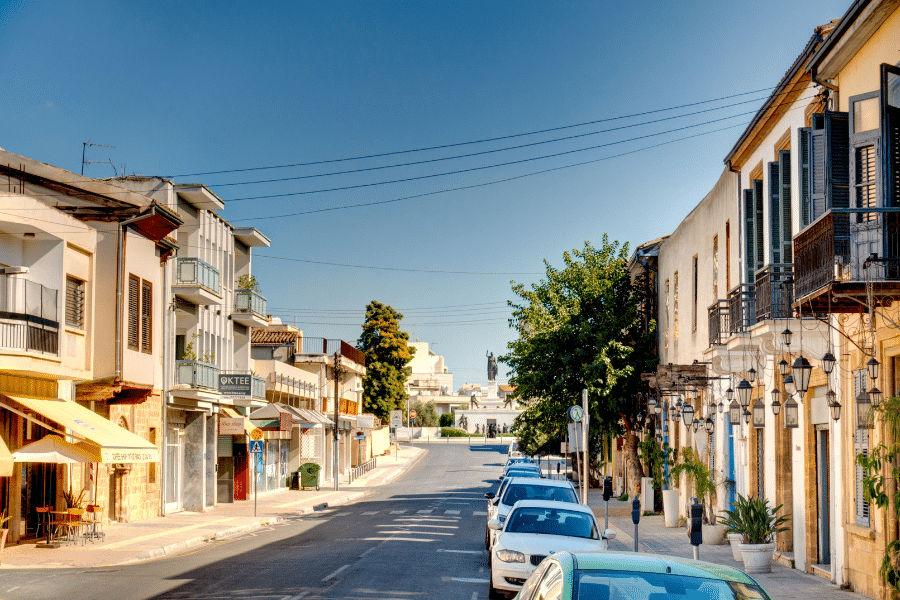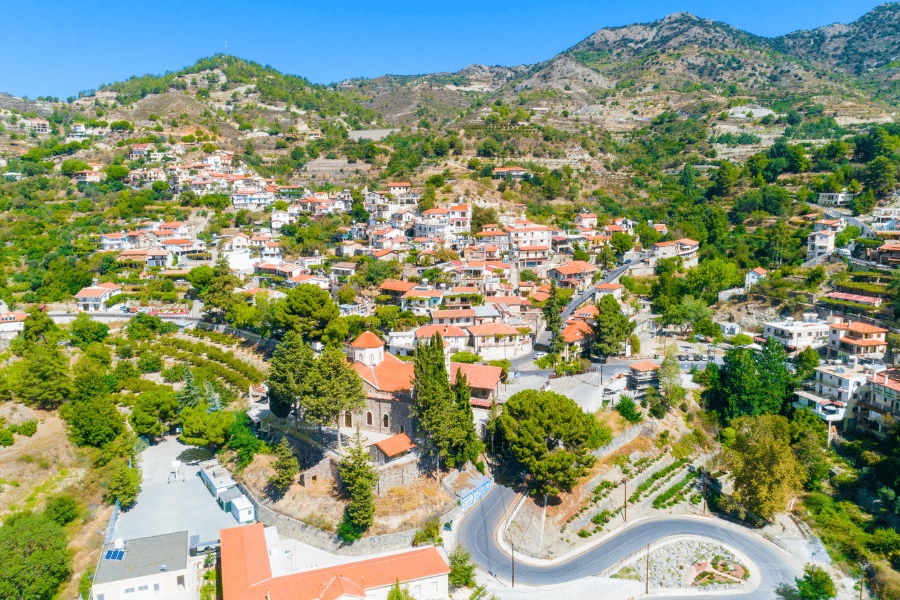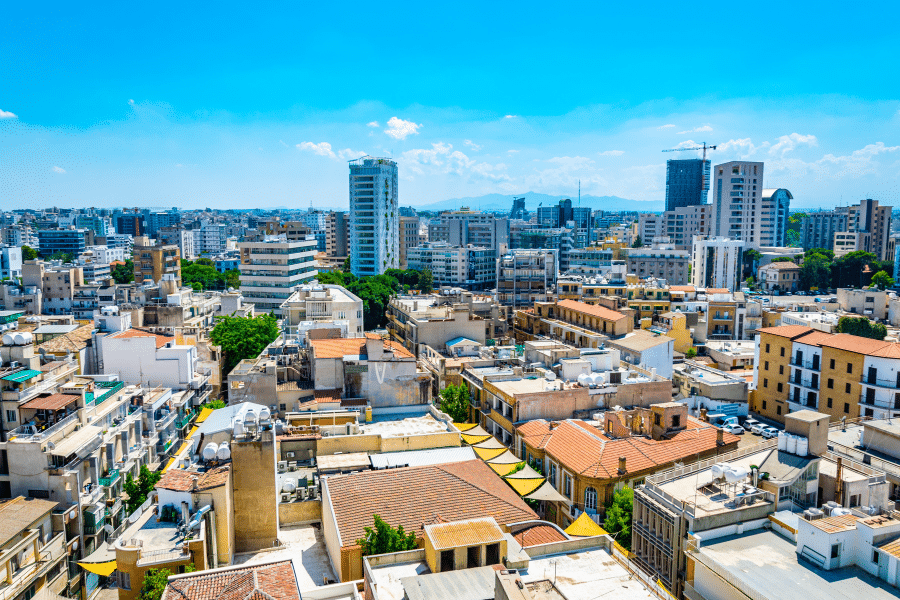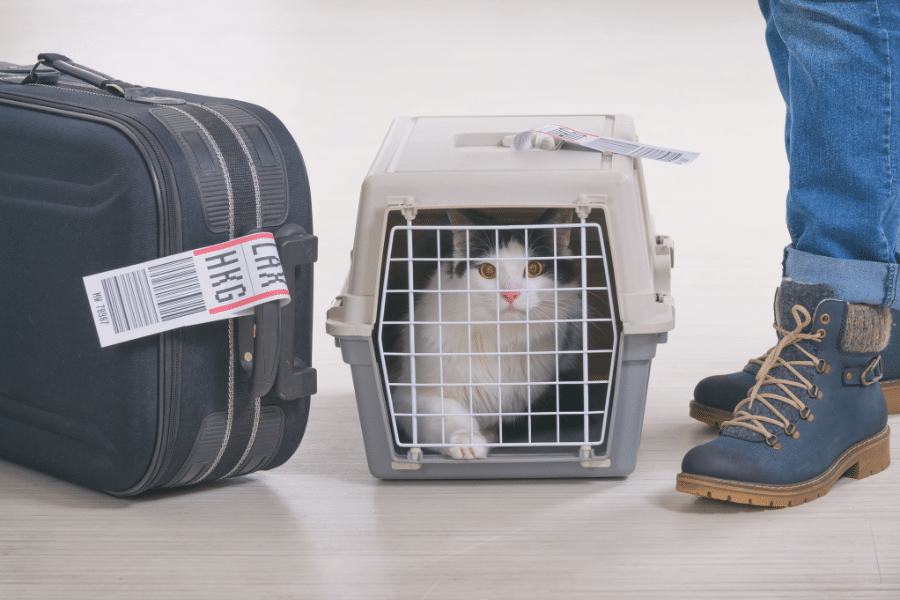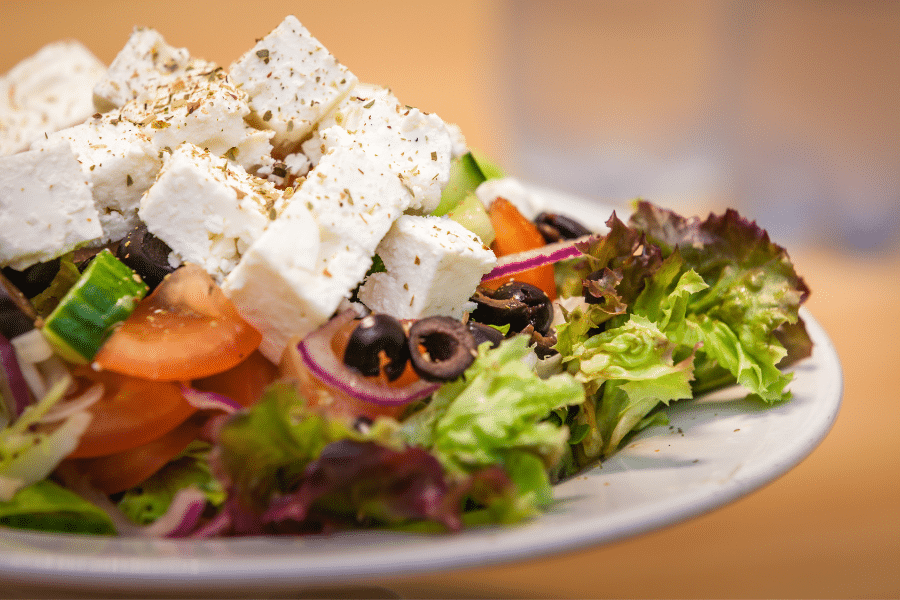Cyprus has long been a coveted haven for expats, offering a mix of breathtaking beaches, archaeological wonders, picturesque villages, and delectable cuisine. Its central mountain range, the Troodos, receives a seasonal dusting of snow, enabling you to ski in the morning and leisurely drive an hour to the sun-kissed coast, truly an extraordinary feature that defines the allure of living in Cyprus.
Contemplating a move to Cyprus requires meticulous research and strategic planning if you want to streamline the relocation process and avoid unnecessary hurdles.
At this juncture, many questions undoubtedly swirl in your mind, and our comprehensive expat’s guide to living in Cyprus was created to provide answers to these important questions.
1. Cyprus visa requirements
For non-EU citizens to live in Cyprus, obtaining a long-stay visa is a requisite. It’s essential to secure this visa before embarking on your Cyprus-bound journey, available through the Cypriot embassy or consulate in your home country. Upon arrival, you must promptly apply for a temporary residency permit within the initial seven days. To accomplish this, visit:
- The Civil Registry and Migration Department in Nicosia, if your chosen abode is within the Nicosia District.
- The local District Immigration Unit in your selected district—be it Limassol, Paphos, or Larnaca.
Should your plans encompass employment in Cyprus, the burden is on your employer to procure a work permit for you.
After five years of residence in Cyprus, you become eligible to apply for permanent residency.
It’s vital to note that meeting two requirements is crucial for permanent residency:
- Acquiring a property valued at €300,000 ($330,000) or higher.
- Maintaining an annual income of at least €30,000 ($33,000) from sources external to Cyprus. For those with dependents, additional income is requisite, €5,000 ($5,500) per child or €8,000 ($8,800) for an elderly parent.
2. Best places to live in Cyprus
Cyprus offers diverse locations and lifestyles for expatriates to savor. Most newcomers look for proximity to the mesmerizing Mediterranean Sea, and barring the capital Nicosia, all major towns are splendidly nestled along the coast.
Paphos on the west coast stands as the darling choice among foreign retirees, flaunting pristine beaches, a superlative standard of living, a vibrant expatriate community, and its own airport.
A close runner-up for living in Cyprus, Limassol, the second-largest city, is an expansive, dynamic hub. It graces the southern coast, a favored holiday haven with top-tier hotels and beaches.
However, it primarily functions as a bustling working community, serving as the nation’s commercial epicenter, teeming with expats from diverse nations. Like Paphos, Limassol maintains its vibrant allure throughout the year and is a popular retirement destination.
To the east lies Larnaca, a more diminutive locale where life revolves around the renowned Phinikoudes coastal promenade. Here, the pace of life is decidedly more leisurely, yet during winter, many businesses hibernate.
The resort towns of Protaras and Ayia Napa follow a seasonal rhythm, with busy summers packed with tourists and fun activities, and a laid-back, very quiet atmosphere in the winter.
Nicosia, the capital, bears the weight of a divisive history since 1974. Situated inland, it experiences sweltering summers and notably chillier winters. This cultural nucleus of Cyprus boasts a plethora of museums, galleries, and theaters, making it a great place to live in Cyprus. Most expats settling in Nicosia do so due to professional engagements.
For those enchanted by the rustic charm of Cypriot village life, the Paphos District offers a multitude of hillside gems brimming with character.
The Limassol District, too, houses its fair share of alluring villages, many nestled amid wine-growing regions or on the southern slopes of the Troodos mountains. As winter envelops these villages, tranquility reigns supreme.
Opting for a trial period, renting in your chosen village or town, proves invaluable to get the feel of the place. It’s only through this immersion that you grasp challenges such as spotty internet, bus services, and proximity to shops.
As you acclimate to Cyprus, unexpected gems may unveil themselves—locales that align perfectly with your preferences.
3. The cost of living in Cyprus
Cyprus boasts a cost of living substantially lower than many counterparts, albeit with a gentle uptick in recent years. A significant boon is the abundance of locally grown fruits and vegetables, available at attractive prices in local markets.
Embracing a genuine Cypriot lifestyle, reveling in seasonal produce, and shunning imported goods substantially mitigate your food expenses. A single individual requires approximately €1,000 per month (rent excluded) for a frugal to moderate lifestyle in Cyprus.
4. Transportation in Cyprus
In this compact country, automobile travel takes the crown as the most convenient mode of transport, given the absence of railways and limited bus services in rural locales.
Driving in Cyprus adheres to the left-hand rule, with road markings and signage patterned after the British system from the colonial era. The principal highway system seamlessly interconnects the major towns of Nicosia, Limassol, Paphos, and Larnaca.
For cost-conscious intercity travel, shared taxis present an economical alternative. Cyprus boasts two international airports, Larnaca and Paphos, offering flights to an array of regional European destinations.
However, direct flights from Cyprus to the United States are absent, necessitating one or two stopovers, contingent on your chosen endpoint. For instance, a journey to Boston might involve a Larnaca-Thessaloniki flight, followed by a Boston-bound leg.
Limassol contributes significantly as a passenger port, facilitating different-length cruises to the Greek Islands, among other destinations.
5. Safety in Cyprus
Cyprus stands as an exceedingly safe country, with crimes within tourist areas often originating from fellow tourists.
6. Healthcare in Cyprus
Cyprus excels in healthcare options, divided into public and private sectors.
Public healthcare offers affordability for EU members. Cyprus’s health-conscious population ranks among Europe’s healthiest, with expats holding permanent residency or EU citizenship eligible for cost-reduced or free healthcare, facilitated through a state medical card.
To mitigate extended medical appointment waiting times, many expats opt for private health insurance, available from local Cypriot firms or international insurance providers.
7. The job market in Cyprus
Securing employment in Cyprus poses challenges, as work permits are a requisite. Employers must demonstrate that the position remains unfilled by a Cypriot or an EU/EFTA national.
Non-EU workers often find opportunities with international companies operating offices in Nicosia or Limassol. Such companies typically operate in shipping, chemicals, food, IT, or software development.
Limited job openings exist in the tourism sector during the holiday season, encompassing roles in hotels or as tour operator representatives at resorts or airports. It’s imperative to ensure that your work entails a granted work permit.
8. Moving your belongings to Cyprus
Two pathways exist for transporting your possessions abroad to Cyprus: air or sea. The more popular choice, sea freight, offers a cost-effective alternative. Shipping from your home country might take four to six weeks, or occasionally more.
Arriving in Cyprus from a non-EU nation prompts inspection of your belongings, potentially incurring duty on new items. The term “new” encompasses all items under six months old, with restricted items typically communicated by the moving company.
9. Moving your pets to Cyprus
Moving pets to Cyprus entails the use of crates transported by air, available as cabin baggage, excess baggage, or cargo.
Prior to departure from your homeland, notification of your intent to the veterinary office is necessary. On arrival, your pet undergoes inspection by a veterinary officer or customs official.
Before leaving your home country, the following requirements apply to your pet:
- Fitting an electronic microchip complying with ISO standards 11784 and 11785.
- Ensuring dogs or cats are at least 12 weeks old and vaccinated against rabies.
- Possessing an official veterinary health certificate for all pets.
- All pets must hold an EU pet passport if traveling within the EU.
It’s important to note that certain dog breeds, including Pit Bull Terrier, Japanese Tosa, Dogo Argentino, and Fila Brasileiro, are prohibited in Cyprus.
10. Learning the Greek language
Greek is the official language of Cyprus. While English enjoys broad use in Cyprus, a rudimentary understanding of Greek proves indispensable if you opt for village living.
While many doctors possess good English skills due to their training in the UK, USA, or Germany, government officials often lack such proficiency. Therefore, a basic grasp of Greek is highly recommended.
Various avenues exist to learn Greek, including classes available in major towns for expats. Online Greek lessons or audio CD courses offer flexible options. Mastering Greek, albeit challenging, requires around 1,000 hours of diligent study and homework.
11. The pros and cons of living in Cyprus
Relocating to another country constitutes one of life’s pivotal decisions. Thorough research during the contemplation phase proves paramount, and a comprehensive assessment of the advantages and challenges faced as a foreigner in Cyprus is essential:
Pros
- Cyprus boasts over 320 days of abundant sunshine annually.
- Cypriots radiate warmth, hospitality, and generosity, contributing to the country’s remarkable safety with a very low crime rate.
- English is widely spoken, with approximately 73% of Cypriots proficient, though fluency may vary among older individuals.
- A lower cost of living, encompassing accommodation and food.
- Housing costs are notably affordable for both renting and purchasing.
- Cyprus is home to splendid archaeological sites, historical monuments, and churches, waiting to be explored.
- The traditional Cypriot diet, rich in vegetables, pulses, and fruit with minimal meat, ranks among the world’s healthiest.
Cons
- Navigating Cypriot bureaucracy can be a time-consuming endeavor.
- Punctuality is not a strong cultural trait; adding a ten-minute buffer to appointments is prudent.
- Gaining employment as a non-EU citizen can prove challenging, with relatively lower salaries, no national minimum wage, and many jobs being seasonal, often without work permits.
- Learning Greek, one of the world’s most challenging languages, is indispensable for a satisfying village life.
- Public transportation in Cyprus is limited, with no rail network and sparse bus services in rural areas.
- While Nicosia offers frequent cultural events and major towns host a variety of concerts and dramatic productions, arts and culture outside of the cities is hard to find.
When meticulously weighing these facets, the island’s unparalleled beauty, coupled with its splendid climate and exceptional food and wine, consistently tilts the scales in favor of embarking on this remarkable journey—to call Cyprus your new home.

